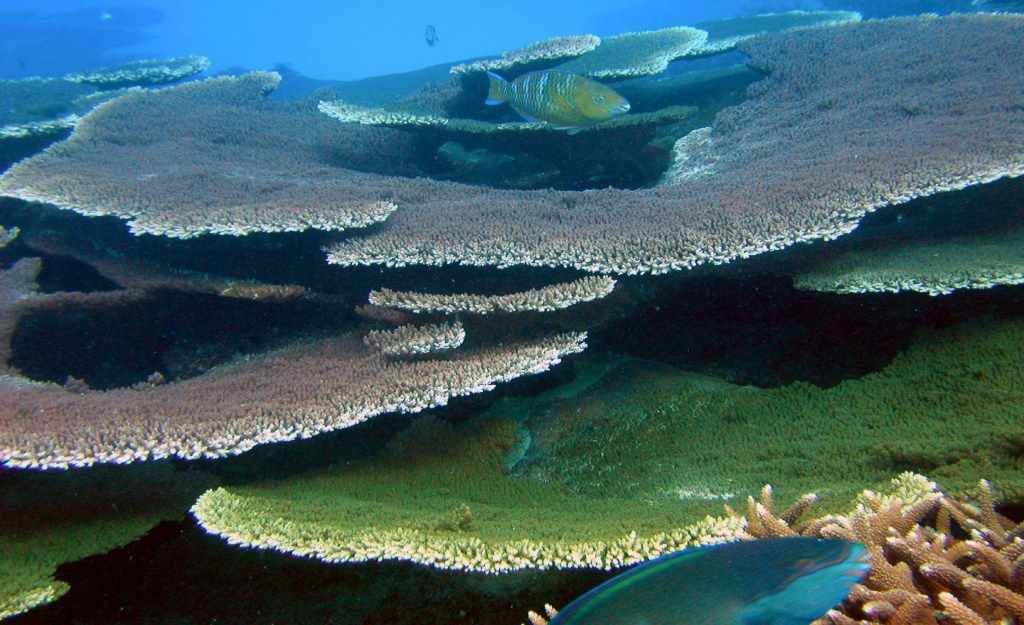Story at a glance
- One of the world’s largest protected marine areas will open again to commercial fishing, the Kiribati government said Monday.
- “Our decision as a sovereign country and Government is people-centric and commensurate with holistic options for marine protection and management, economic diversification, sustainable tourism and fisheries, to promote the growth of Kiribati’s blue economy, and uplift the lives of all I-Kiribati,” a government statement said.
- The government added that it has been unable to make up lost revenue caused by the creation of PIPA, although the Pacific Island nation said it was assured it would be able to recoup potential losses.
One of the world’s largest protected marine areas will open again to commercial fishing, the Kiribati government said Monday.

In this 2002 photo released by New England Aquarium, spectacular table corals that take decades to form are found throughout the shallow water coral reefs of the Phoenix Islands, Kiribati. AP Photo/New England Aquarium, David Obura, HO
The Phoenix Islands Protected Area (PIPA), located in the south Pacific, was designated as a “no-take” zone in 2015, which prohibited commercial fishing in the area encompassing more than 157,000 square miles, The Guardian reported.
“Similar to any Government, our decisions, as we make them, put the livelihoods of our people at the fore and have been carefully considered and agreed to as a Government,” a government press statement read, referring to the economic benefits the nation could receive by lifting the commercial fishing ban, according to The Guardian.
“Our decision as a sovereign country and Government is people-centric and commensurate with holistic options for marine protection and management, economic diversification, sustainable tourism and fisheries, to promote the growth of Kiribati’s blue economy, and uplift the lives of all I-Kiribati.”
The government reportedly added that it has been unable to make up lost revenue caused by the creation of PIPA, although the Pacific Island nation said it was assured it would be able to recoup potential losses.
The area is home to around 800 known species of fauna, including about 200 coral species, 500 fish species, 18 marine mammals and 44 bird species, according to UNESCO.
America is changing faster than ever! Add Changing America to your Facebook or Twitter feed to stay on top of the news.
Former president Anote Tong, the leader credited with overseeing the formation of the protected area, said he was disappointed by the announcement.
“I never expected that this would happen,” Tong said. “And this was precisely the reason that we put it into legislation. Because it had to be something that would remain regardless of any political changes.”
But Conservation International’s Asia-Pacific field division senior vice president, Richard Jeo, told the outlet the measure “would need to be formally approved by parliament before going into effect,” noting the proposal has yet to be introduced.
“There is significant geopolitics at play in the Pacific region, and as a sovereign nation, Kiribati has the authority to decide on the future of PIPA.”
Jeo told the outlet the organization is hopeful Kiribati would make the decision “to continue as a global conservation leader, standing lockstep with a global community that is committed to protecting 30% of land and sea by 2030.”
READ MORE STORIES FROM CHANGING AMERICA
BIBLICAL PLAGUE OF DEADLY SCORPIONS WASHES OVER STREETS IN EGYPT
SHARKS SPOTTED IN FAMOUS RIVER THAT RUNS THROUGH LONDON
GIANT INVASIVE PYTHONS ARE SLITHERING NORTH IN FLORIDA
BIZARRE NEW SPECIES OF BEAKED WHALE DISCOVERED THAT LIVES 6,000 FEET DEEP
MORE THAN 12 MILLION INVASIVE ASIAN FISH REMOVED FROM TWO US LAKES
changing america copyright.